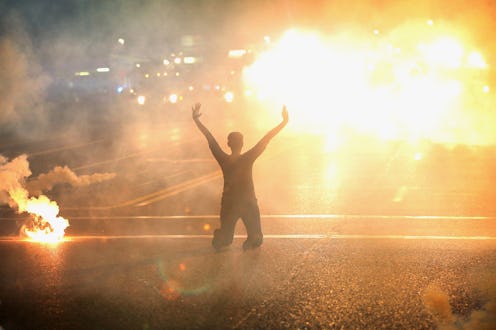News
I'm From St. Louis & Things Still Aren't Better After Michael Brown

The NAACP recently issued a travel advisory warning minorities to use abundant caution while in Missouri, citing incidents of racial discrimination in interactions between Missouri police officers and civilians of color in its reasoning. When I heard of the warnings, I thought of recent deaths in the state, such as Tory Sanders, a mentally ill black man who died after repeatedly being shocked by a stun gun while in police custody. But what instantly came to my mind was the death of Michael Brown three years ago.
When Brown was killed in 2014, St. Louis had long had a reputation for being one of the most dangerous cities in the United States based on its violent crime rate. The racial and socioeconomic tensions hiding beneath the public eye only exacerbated the growing uneasiness.
People are aware of the inequalities and how they were never directly addressed when Brown died (or before, or after). A murder in St. Louis often equals a quick sentence or two in the nightly local news report. What happened in Ferguson was only out of the ordinary because not only did it manage to make national news, but it also stayed in the spotlight for more than a few days.
But from the often disputed 2014 death of Vonderrit Myers to a recent case in 2017, in which a white police officer shot his off-duty black colleague, police shootings of black people in St. Louis aren’t anything new.
Nothing has changed — not after Brown’s death, or any of the others. Gun control policies weren’t reformed, no one wanted to even hint at racism. Everything stayed the same, and now the NAACP is warning people not to come here.
St. Louis’ branch of the NAACP initially opposed the advisory, claiming it would hurt the city’s economy and place African-Americans at risk of danger. But a few days later, the group decided to support the advisory, saying their change came “after additional study and consultation with our state conference.”
The NAACP’s advisory just reaffirms how little change has been made.
Part of that decision came because of Senate Bill 43, which is scheduled to be taken into effect in the state at the end of August. The new bill, which was approved by Missouri’s new governor, Eric Greitens (who also cut the funding for my school), requires people to explicitly prove that their race or sex was a motivating factor in their mistreatment when they file a lawsuit.
Proponents of the bill believe it would help weed out faulty claims made by those looking to make a quick buck, but opponents of the bill say it’ll make it harder for minorities and women to prove discrimination both in the workplace and from housing administrations.
The murder of Mike Brown wasn’t revolutionary to me or the people I grew up with. No one believed the attention surrounding his death was going to cleanse the area of its racial disparities. Sure, some police officers lost their jobs, but that wasn’t justice. A life was lost, and the lack of a proper trial indicated that authorities believed it was no one’s fault. A conversation had been started, but that was it — and it still feels there hasn't been any progress. The NAACP’s advisory just reaffirms how little change has been made.
President Trump has ignored rises in hate crimes, made divisive statements toward every minority he can think of, and literally called for an increase in police brutality (a video you have to see to believe). While President Obama didn’t do much in regards to police brutality, it’s certainly hard to have hope in President Trump as the force what will bring all races together.
Brown died three years ago, and despite people’s continuing reluctance to mention racial bias, the issue still exists. While I didn’t think we’d all be sitting hand-in-hand in a post-racial America in 2017, I also didn’t expect for the NAACP to straight-up warn people to avoid the place where I live.
The KKK might not be marching down the streets, but black people are being warned to not go to a state because they’re at risk of dying. What a way to illustrate how little has changed after the death of Michael Brown.